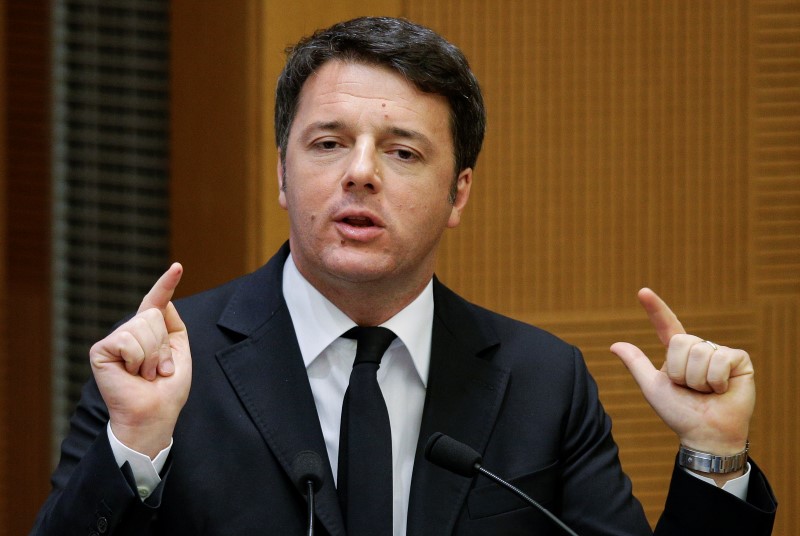By Gavin Jones
ROME (Reuters) - Italian Prime Minister Matteo Renzi staked his political future on Tuesday on a referendum over constitutional reform next year, saying he would consider his career in government to have been a failure if the ballot goes against him.
Renzi has piled political capital into a bill to effectively abolish the upper house Senate as an elected chamber. Renzi says this will make the country more governable but his critics say it reduces democratic checks and balances.
It will cut the number of senators by two thirds, strip the Senate of its ability to bring down a government and sharply limit its scope to block legislation.
Renzi said the referendum on the bill, which is currently going through parliament, will probably be held in October.
"It's clear that if I lose the referendum I will consider my political experience to have failed," Renzi said at his traditional end-year news conference.
One reason why the stakes are so high is that the Senate is inextricably tied to Renzi's other main political reform: the introduction of a new, two-round voting system.
The electoral reform has already been passed by parliament but it envisages direct elections only for the Chamber of Deputies and so cannot work unless if the Senate is scrapped in its current form. The reformed Senate would be made up of regional councillors and mayors.
The referendum promises to be bitterly contested, with all the main opposition parties set to campaign against the changes.
SLIDE IN SUPPORT
Renzi made light of opinion polls showing his Democratic Party (PD) has steadily lost support this year, and played down any potential political fallout from mayoral elections in the spring of 2016 in Italy's main cities.
"The local elections are to elect mayors not (to change) the prime minister," said the 40-year-old former mayor of Florence.
Recent polls indicate that if elections were held today under the new voting system they may well be won by the anti-establishment 5-Star Movement.
"A real leader's job isn't to believe or not believe the polls but to change them," Renzi said, adding that he no longer read opinion polls.
In a news conference of more than two hours, Renzi maintained recent critical tones towards the European Commission but said he was not attacking Europe, merely demanding fair treatment for Italy.
Rome has been frustrated by a series of Commission decisions covering areas from immigration to bank rescues, state aid for a steel plant and fiscal policy.
Renzi said that if decisions continue to go against Italy it would consider appealing to the European Court of Justice, the EU's highest court, which is based in Luxembourg.
A frequent critic of what he sees as German-inspired austerity policies, Renzi said the EU was pursuing "a mistaken model of economic policy that doesn't work," and called instead for "flexibility, growth and investment."
Italy has been the euro zone's most chronically sluggish economy for the last decade and both its public and private investment languish far below the average of the 18-nation bloc.

Renzi said he was "taking for granted" that Brussels would pass his 2016 budget, though the Commission said last month Italy was among four countries whose budget risked breaking EU fiscal rules, and postponed a definitive judgement until spring.